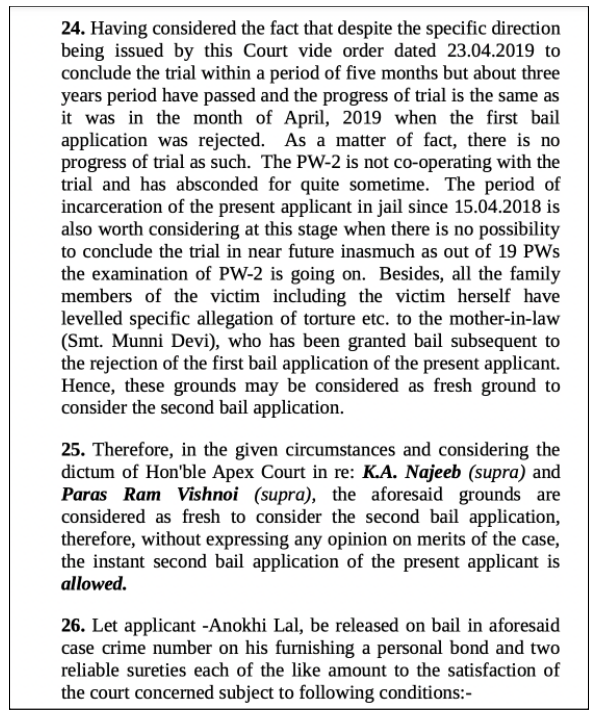In this review of Court judgments, we look at Kerala High Court’s directions regarding the powers of Family Courts, Allahabad High Court’s observation regarding a bail application and rejecting the applicant’s theory of Right of Private defence. We also look at Supreme Court’s observation regarding repayment of amount regarding an irregular appointment and its observation regarding a Will.
Kerala HC: Family courts can order enquiry to find out the truth
A Division Bench of Justice A. Muhamed Mustaque and Justice Sophy Thomas of the Kerala High Court observed that the presiding officer of a Family Court was not expected to remain a neutral umpire while resolving disputes but was empowered to order enquiry to find out the truth.
In the case Nisha Haneefa vs. Abdul Latheef & Ors, the Kerala High Court made some important observations regarding the functions of the family courts in India and asserted that a family court is empowered with inquisitorial powers.
The question put forth before the High court, in this case, was if Family Courts have to remain neutral umpire of the real dispute between the parties.
Getting into the details of the case, the petitioner i.e., the wife has moved the family court against her husband and his parents claiming the realisation of patrimony and recovery of gold ornaments.
The Family court suspected a collusive effort between the husband and wife against the husband’s parents and ordered an enquiry to see if they were residing separately, if so, since when. The family court had this suspicion after the in-laws of the petitioner alleged that the petition was filed to counter the action of the husband’s father, who revoked the settlement deed executed in favour of the husband.
The petitioner approached the High Court challenging Family Court’s order for enquiry.
As per Sections 9, 10 and 24 of the Family Courts Act, it was found that Family Court was specially entrusted with the powers that distinguish it from an ordinary civil court.
- Adjudicative power following the rules of procedure as applicable under the adversarial system.
- A proactive role for settlement of disputes between the parties
- Inquisitorial Power to enquire into the truth of the matter.
Based on the provisions in the Family Courts Act, the High Court observed that while dealing with a dispute, the Family Court has complete freedom to define the procedure for a speedy resolution and its decision cannot be questioned before a higher court.
The court also made observations on the role of the presiding officer in the Family court. It noted that while the Family court may require following the procedures, it does not restrict it from using inquisition.
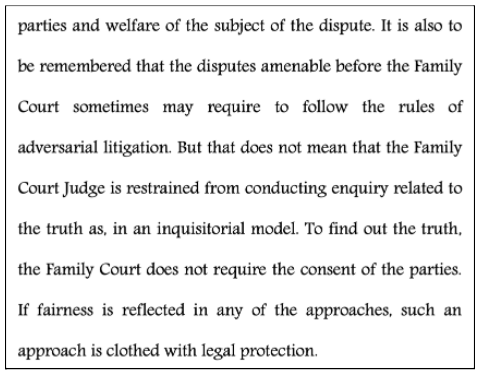
It highlighted that the focus of the adjudication is on the parties and not on the disputes. The High Court further observed that the focus of Family courts on the disputes and the ensuing orders is resulting in these orders being challenged in higher courts.
Allahabad HC: Upholds a life sentence and states that the Right of private defence is not acceptable
In the case Raj Kumar and Raj Kishore vs. The State, Allahabad High Court (Lucknow Bench) rejected the theory of ‘Right to Private Defence’ put forth by the convict (first appellant) and upheld the life imprisonment awarded by the trial court.
However, the bench consisting of Justice Ramesh Sinha and Justice Saroj Yadav, set aside the conviction of the second appellant as the court has noted that the prosecution has failed to prove a prior meeting of both the appellants.
The case was a 42-year-old case, where-in as per the FIR, the uncle (Prabhu Das) of the complainant found the cattle of the first appellant grazing and destroying the paddy crop and reached out to the second appellant to complain about the same.
Both the first appellant and the second appellant had an altercation with Prabhus Das, with the former bringing a gun and the latter a stick. In the following altercation, the father of the complainant of the case was shot by the first appellant with a gun. While this claim was contested stating that the deceased and others have initially provoked with the usage of a country-made pistol, the trial court concluded that both the appellants had a common intention to kill, and both were held guilty under Section 302 read with Section 34 of IPC along with Section 305 for causing grievous hurt to Prabhu Das.
In the current case before the Allahabad High court, the first appellant raised a plea that he had fired the gun in the exercise of his right to private defence. The court observed that the second appellant had not stated anything about the exercise of the right of private defence. Furthermore, there was no country made pistol found near the dead body and the first appellant did not receive any injury nor was there any damage to his property. He also had an option to escape from the place instead of retaliation.
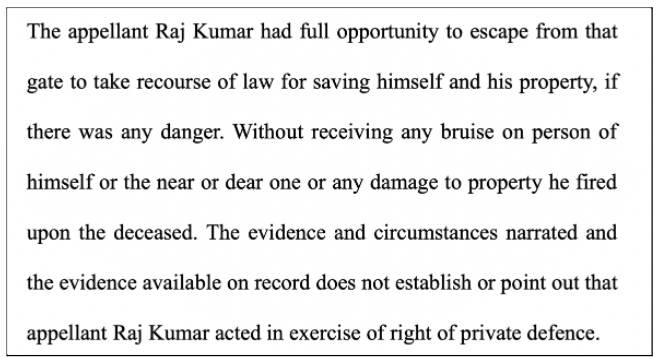
Hence, the court concluded that the first appellant had fired upon the deceased with the intention to kill and is rightly punished by the trial court. As for the second appellant, there was no evidence that proved that he had prior interaction with the first appellant and hence is not a party to shooting the deceased. However, he is prosecuted for causing grievous hurt to the uncle of the complainant.
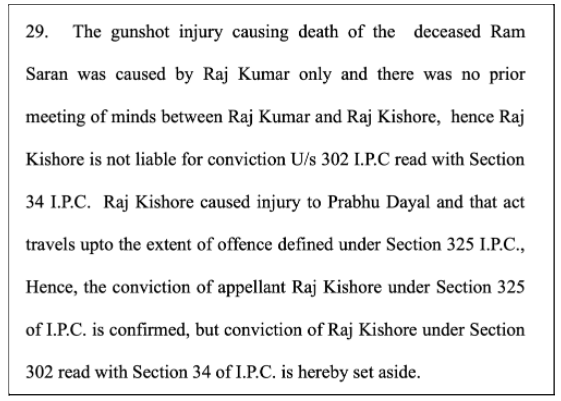
Supreme Court: Even if the appointment was irregular, State must pay the salary for work done by an employee
In the case, Man Singh vs. State of Uttar Pradesh, the Supreme court set aside a direction to recover from a person the salary paid to him after the appointment as a teacher was found to be irregular.
The bench comprising of Justice Hemant Gupta and Justice V Ramasubramaniam noted that the person had worked for nearly 24 years before the service was cancelled on the basis of the appointment being irregular. He was a relative of a member of the selection committee and the appointment was against the rules. While cancelling the appointment, the State has also directed for the recovery of the salary paid to him.
The bench noted that the high court ought to have taken cognizance of the 24 years of service. Even though the appointment was irregular, the appellant has discharged the duties. Hence, the State cannot take any work from any employee without the payment of any salary.
The Supreme Court set aside the earlier order and directed the authorities to treat the appellant as retired on the date of order and pay pensionary benefits if any.
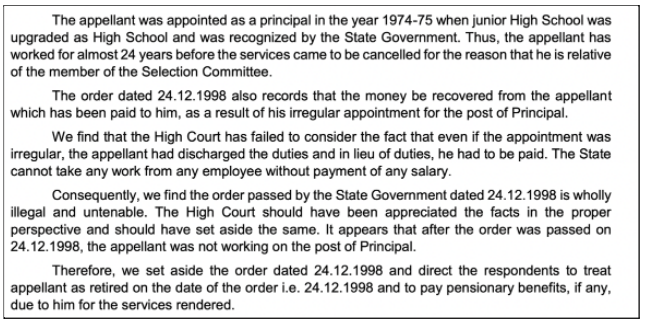
Supreme Court: Will’s genuineness is not based on whether the distribution was fair & equitable
In the case of Swarnalatha vs. Kalavathy, the Supreme Court observed that the exclusion of one of the natural heirs from the bequest in a Will, cannot by itself be a ground to hold that there are suspicious circumstances.
The case is in respect to two Wills and Testaments, one by the father and another by the mother of the appellant. They were set aside by the Madras High Court citing suspicious circumstances. As per the high court, the total exclusion of the daughter from the bequest and not being mentioned in the wills, and the dates on which the daughter was paid certain amounts point towards suspicious circumstances.
The bench comprising of Justice Hemant Gupta and C. Ramasubramanian remarked that there is no scope for the court to see whether the distribution made in the will was fair and equitable to all the children.
The Supreme court stated that it was not even a case where the testators were not in a sound and disposing state of mind. The exclusion of natural heirs cannot be by itself a ground to hold suspicious circumstances. Further, the reasons given in the Will are convincing enough to show the exclusion happened in a natural way.
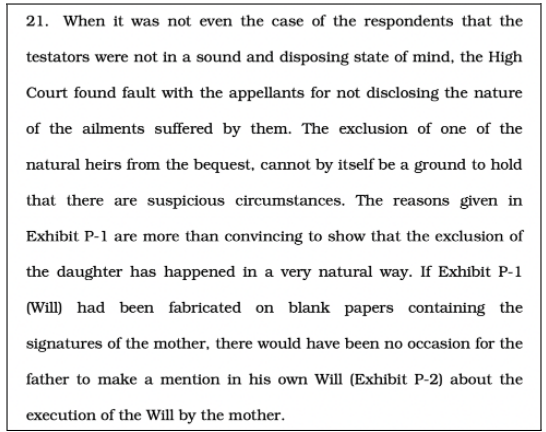
The Apex court referred to earlier cases, where the cases in which suspicion is created are essentially those where either the signature of the testator is disputed, or the mental capacity of the testator is questioned.
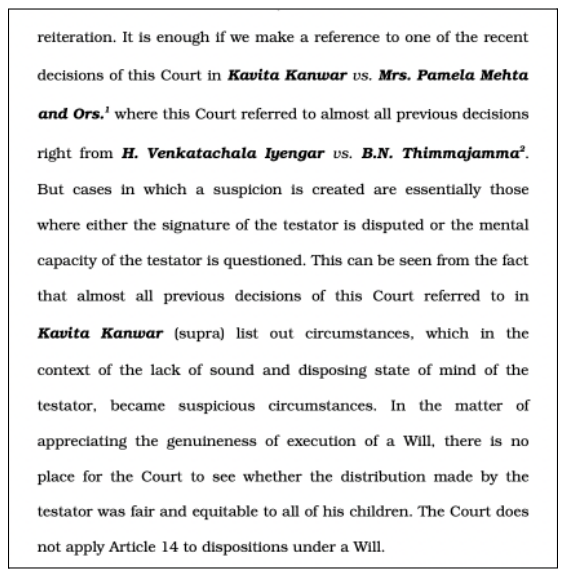
Allahabad HC: Long periods of incarceration and no possibility of a concluding trial can be fresh ground for bail application
Allahabad High Court’s bench comprising of Justice Rajesh Singh Chouhan observed that if there is no possibility of the trial concluding in the near future and the accused is in jail for a substantially long period by then, such a long period of incarceration can be considered as a fresh ground for granting bail
The bail application was submitted by Anokhi Lal, who has been in jail since April 2018 under Dowry Prohibition Act.
The court was dealing with the second bail application of Anokhi Lal, who was booked under Sections 498-A & 304-B IPC and Section 3/4 of the Dowry Prohibition Act in connection with dowry death.
The Counsel applying for the bail argued that three years have passed in trial while there was a direction of the High Court to the trial court to conclude the trial within five months. Since the accused is cooperating with the trial, the delay is not a fault of his but on part of the prosecution.
Allahabad High Court has taken into consideration the Supreme Court order in the case of K.A.Najeeb and Paras Ram Vishnoi, to grant the bail.
